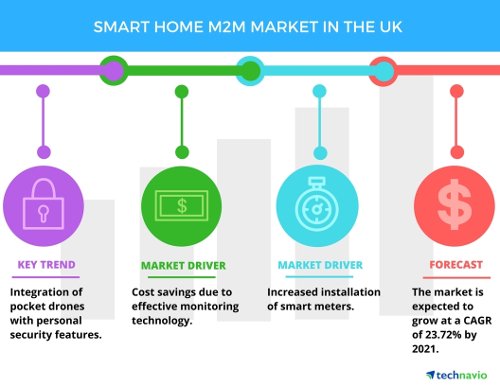UK smart home M2M market to grow at 24% CAGR through 2021
Thursday, June 1st, 2017
Smart Home M2M Market in the UK to Grow at 24% CAGR Through 2021, Reports Technavio
LONDON — Technavio market research analysts forecast the smart home M2M market in the UK to grow at a CAGR of close to 24% during the forecast period, according to their latest report.
The market study covers the present scenario and growth prospects of the smart home M2M market in the UK for 2017-2021. The report also lists energy management and climate control systems, home appliances, lighting control systems, home entertainment systems, security and access control systems, and healthcare systems as the six major application segments for the smart home M2M market in the UK.

Technavio analysts highlight the following three market drivers that are contributing to the growth of the smart home M2M market in the UK:
- Increased installation of smart meters
- Rise in the use of thermostats
- Adoption of cloud-based technologies
Increased installation of smart meters
Smart meters offer a wide range of interactive and intelligent solutions. They allow the consumers to manage energy resources effectively by providing consumption details continuously. They send the relevant home energy usage details to the energy supplier so that the electricity bill can be generated and delivered without the obligation to physically check the reading on the home meter. A smart meter combined with an in-home display (IHD) offers real-time data about the use of gas and electricity. These smart meters help the consumer to monitor and control energy devices effectively using energy management systems (EMS). Therefore, peak demand rates and blackouts can be avoided by installing these devices instead of the traditional systems.
“This rolling out of smart meters will help customers to experience energy-efficient methods, which drastically reduces the prohibitive costs of energy. Smart meters of the future will function as the gateway between smart homes and smart grids. They would be equipped to manage the demand and supply of the energy sources in tandem with the home energy management systems,” says Abhishek Sharma, a lead analyst at Technavio for M2M and connected devices research.
Rise in the use of thermostats
Programmable thermostats are devices that are used to adjust the room temperature to the desired level automatically. They are used to manage the energy supply inside homes. These devices enable users to set the required temperature inside the house from a remote location using a smartphone or a tablet. The maximum demand for these devices comes from energy and utility retailers.
The shipment of these devices is rapidly increasing in Western Europe including the UK region with the increasing need for programmable thermostats. Heating and cooling applications generally produce high electricity bills. Therefore, programmable thermostats and zone-based thermostats can be used as energy-efficient solutions to reduce the excessive costs of energy. Users can save up to USD 180 per annum by implementing home automation solutions like smart thermostats.
Adoption of cloud-based technologies
The smart home cloud center platform can be categorized into three divisions, namely cloud service platform, carrier platform, and smart IoT gateway. Cloud-based services decrease the complexity of software issues that crop up in the connected devices and facilitate interoperability of devices in a simpler way. Most residential users are rapidly adopting cloud-based home security solutions that have self-monitoring and remote-service features. It provides a user-friendly interface to homeowners helping them to arm, disarm, and check the security status of their house from a remote location. Further, cloud-based services are also used to store images captured by surveillance systems so that they can be used in the future.
“Cloud-based services ensure low cost of ownership and on-demand scalability without any additional cost to the homeowners. Hence, smart homes have the potential of having a huge presence in the UK market with the growth of cloud technology,” says Abhishek.
Latest News
- Netflix posts first quarter 2024 results and outlook
- Graham Media Group selects Bitmovin Playback
- Dialog, Axiata Group, Bharti Airtel agree on merger in Sri Lanka
- Yahoo brings identity solutions to CTV
- Plex has largest FAST line-up with 1,112 channels
- TV3 migrates from on-prem servers to AWS Cloud with Redge